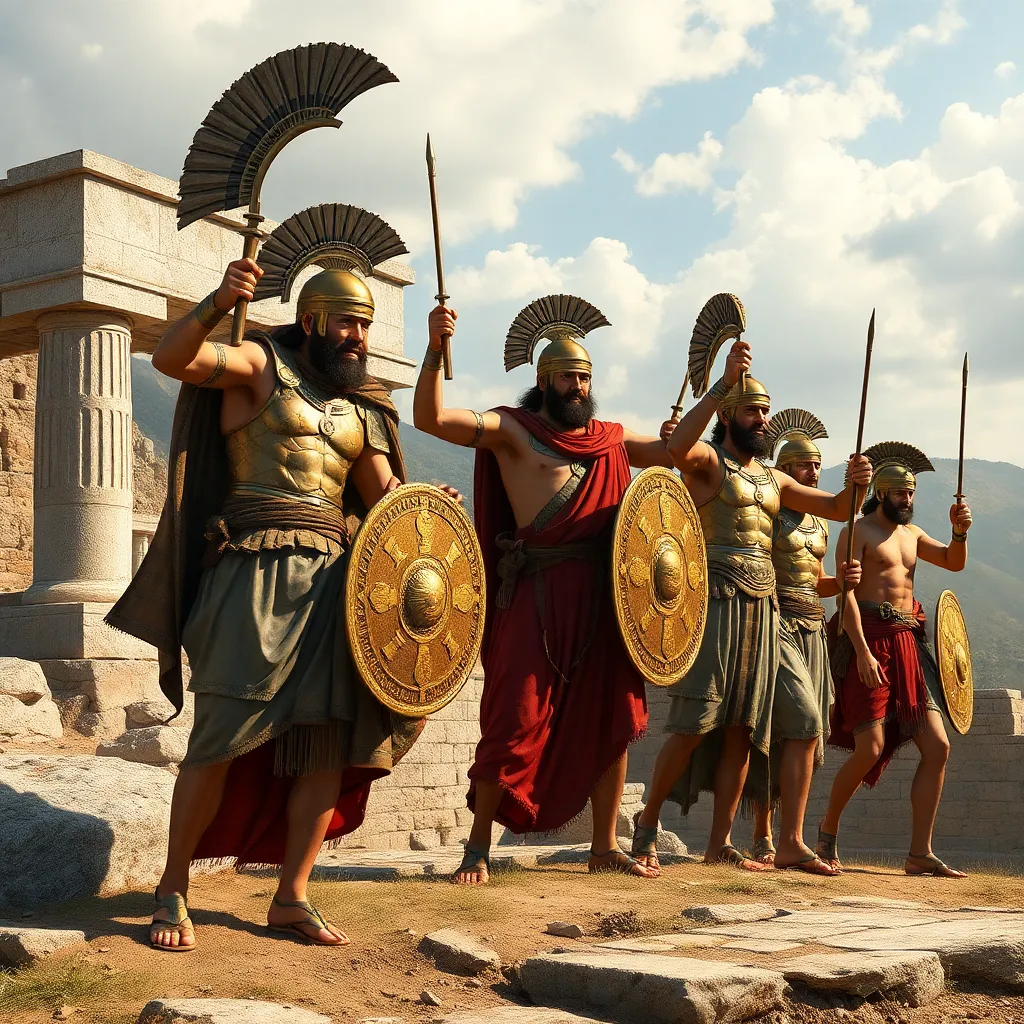The Olympians and Their Role in the Development of Ancient Greek Warfare
I. Introduction
Ancient Greek warfare was characterized by a unique blend of strategic innovation, fierce competition, and profound religious significance. The city-states of Greece, each with its own military traditions, were often engaged in conflicts that shaped the course of their history. Central to the cultural identity of the Greeks were the Olympian gods and goddesses, who played a pivotal role in both the ideation and execution of warfare.
This article aims to explore the connection between the Olympians and the development of warfare in Ancient Greece. By examining the roles and attributes of these deities, we can better understand how they influenced military practices, societal values, and the Greek worldview.
II. The Olympians: Who Were They?
The Olympians were the principal deities of Ancient Greek mythology, residing atop Mount Olympus. They were revered for their various domains, powers, and attributes, each contributing to different aspects of life and society.
- Zeus: King of the gods, associated with thunder and justice.
- Athena: Goddess of wisdom, warfare, and strategy.
- Ares: God of war, representing the chaotic and brutal aspects of battle.
- Hera: Queen of the gods, protector of marriage and family.
Among these deities, Athena and Ares held particular significance in the context of warfare. Through their myths and worship, they shaped military ethics, strategies, and the societal perception of war.
III. Athena: The Goddess of Wisdom and War
Athena was not only the goddess of wisdom but also a formidable warrior. Her dual role in warfare combined intelligence with martial prowess, making her a revered figure for strategists and soldiers alike.
Athena’s influence is evident in:
- Military Tactics: She was often depicted as a guide for heroes, offering strategic advice during battles.
- Planning: Her wisdom was sought in the preparation and execution of military campaigns, emphasizing the importance of strategy over sheer force.
The cult of Athena, particularly in cities like Athens, underscored her significance in military contexts. The Parthenon, a temple dedicated to her, served not only as a religious site but also as a symbol of Athenian power and military success.
IV. Ares: The God of War
Ares, in contrast to Athena, represented the more chaotic and brutal side of warfare. Often depicted as a violent and aggressive deity, Ares embodied the physicality of battle rather than the strategic elements.
His influence on the perception of warfare among the Greeks was profound:
- Fearlessness in Battle: Ares was idolized for his bravery and ferocity, traits that many warriors aspired to emulate.
- Martial Behavior: His characteristics shaped how soldiers viewed the act of fighting, often glorifying the bloodshed and chaos of war.
Despite his fearsome reputation, Ares was not universally revered; he often faced disdain from other gods and mortals alike, reflecting the complex nature of warfare in Greek society.
V. The Role of Rituals and Festivals
Rituals and festivals played a crucial role in intertwining religion with military practices in Ancient Greece. The Olympic Games, originally held in Olympia, were not merely athletic competitions but also a celebration of the gods, with significant military implications.
- Military Training: The games served as a venue for soldiers to showcase their skills, fostering camaraderie and competition among city-states.
- Rituals Before Battles: Soldiers often performed rituals dedicated to the Olympians, seeking divine favor and protection before going into battle.
Festivals honoring gods associated with warfare, such as Athena and Ares, further solidified the connection between divine will and military success, reinforcing the belief that favorable outcomes in battle were influenced by the gods.
VI. The Olympians as Symbols of Unity and Valor
The religious beliefs surrounding the Olympians significantly impacted political alliances and military coalitions among Greek city-states. The shared worship of these deities acted as a unifying force during times of conflict.
- City-State Alliances: The common reverence for the Olympians helped forge temporary alliances, as city-states united against common enemies, believing they fought under divine favor.
- Divine Favor: Military leaders often invoked the blessings of the gods, using them as symbols of unity and valor to inspire their troops.
Examples of military coalitions inspired by divine favor include the alliances formed during the Persian Wars, where shared beliefs in the gods’ support played a crucial role in rallying the Greek city-states against a formidable foe.
VII. The Influence of Olympian Ideals on Military Leaders
Military leaders in Ancient Greece often drew inspiration from the qualities embodied by the Olympians. Their virtues, such as courage, wisdom, and strength, served as guiding principles for commanders in battle.
- Inspirational Figures: Leaders like Pericles and Alexander the Great were known to align their strategies with the ideals represented by the gods, invoking their qualities in their leadership.
- Divine Symbolism: Military insignias and standards often featured references to the Olympians, reinforcing the connection between divine approval and military success.
The integration of these ideals into military leadership not only shaped the conduct of warfare but also influenced how leaders were perceived by their followers and society at large.
VIII. Conclusion
The Olympians played an integral role in shaping the nature of warfare in Ancient Greece. Through their attributes, myths, and the rituals dedicated to them, these deities influenced military practices, societal values, and the very perception of war itself.
The legacy of the Olympians in military tradition continues to resonate, illustrating the deep interplay between religion and warfare in Ancient Greek culture. As we reflect on this connection, it becomes evident that the Olympians were not just figures of myth, but vital components in the narrative of Greek history and its martial identity.




